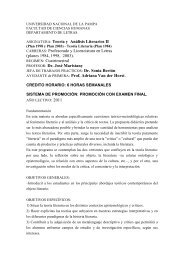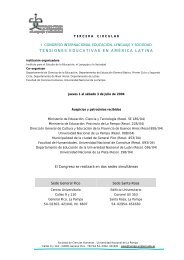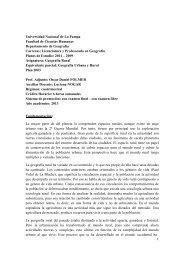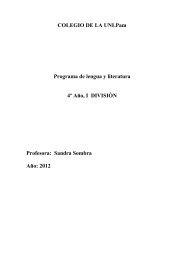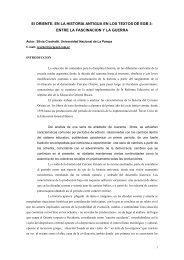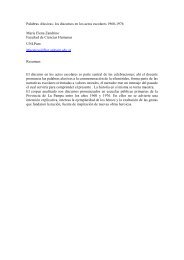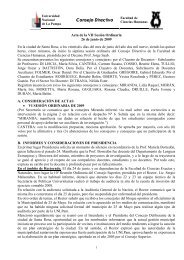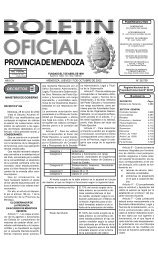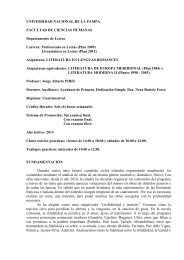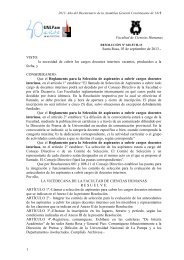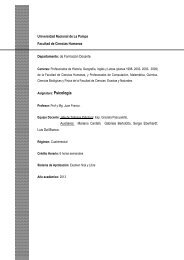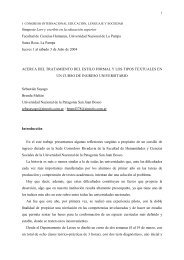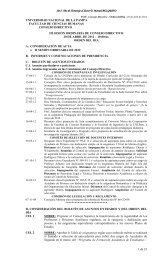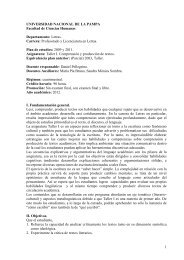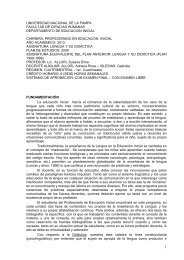Preliminares de Lengua Inglesa - Facultad de Ciencias Humanas
Preliminares de Lengua Inglesa - Facultad de Ciencias Humanas
Preliminares de Lengua Inglesa - Facultad de Ciencias Humanas
Create successful ePaper yourself
Turn your PDF publications into a flip-book with our unique Google optimized e-Paper software.
UniversidadNacional<strong>de</strong> La Pampa<strong>Facultad</strong> <strong>de</strong><strong>Ciencias</strong> <strong>Humanas</strong>Departamento <strong>de</strong> <strong>Lengua</strong>s ExtranjerasCarreras: Profesorado <strong>de</strong> Inglés (Planes 2009-2002-1998)Licenciatura en <strong>Lengua</strong> y Literatura <strong>Inglesa</strong> (Planes 1997-2002)Licenciatura en Inglés. Orientación: Lingüística Aplicada (Plan 2011)Licenciatura en Inglés. Orientación: Estudios Literarios (Plan 2011)Asignatura: <strong>Preliminares</strong> <strong>de</strong> <strong>Lengua</strong> <strong>Inglesa</strong>Profesor: Norma Liliana Alfonso (Prof. Celia M. Coll en uso <strong>de</strong> licencia)Docentes Auxiliares: María Aurelia Kin (Ayte regular)María Natalia Rossi (Ayte regular)Régimen: AnualCrédito horario: 20 (veinte) horas semanalesSistema <strong>de</strong> promoción: examen final – examen libreAño académico: 2013FundamentaciónDe acuerdo al Plan <strong>de</strong> Estudio vigente, los ingresantes al Profesorado <strong>de</strong> Inglés <strong>de</strong>bencumplir con un requisito: presentarse a un Test <strong>de</strong> Diagnóstico <strong>de</strong> carácter obligatorio perono eliminatorio. Todo aquel estudiante que <strong>de</strong>muestre poseer un nivel intermedio <strong>de</strong>conocimiento <strong>de</strong>l idioma, ingresa al Primer Año <strong>de</strong> la carrera. Aquellos estudiantes que nocumplan con este requisito, pue<strong>de</strong>n asistir durante un año académico al Ciclo Propedéuticocompuesto <strong>de</strong> la asignatura <strong>Preliminares</strong> <strong>de</strong> <strong>Lengua</strong> <strong>Inglesa</strong>.En esta asignatura se propen<strong>de</strong> a alcanzar un nivel intermedio <strong>de</strong> conocimiento <strong>de</strong>l idiomainglés en las áreas <strong>de</strong> lectura, escritura, producción oral y comprensión auditiva, necesariopara su ingreso al Primer Año <strong>de</strong> la carrera. Los objetivos <strong>de</strong> esta asignatura apuntan a lacapacitación <strong>de</strong>l estudiante en la adquisición y utilización <strong>de</strong> las habilida<strong>de</strong>s lingüísticasnecesarias.Objetivos• Desarrollar estrategias para la utilización <strong>de</strong> vocabulario y estructuras gramaticalesadquiridas en la producción y análisis <strong>de</strong> <strong>de</strong>scripciones, narraciones yargumentaciones que reflejen sus necesida<strong>de</strong>s e intereses.• Desarrollar la comprensión y el análisis <strong>de</strong> textos tanto por medio <strong>de</strong> la lectura comopor medio <strong>de</strong> material grabado.• Reforzar lo aprendido en forma oral por medio <strong>de</strong> la escritura.• Fomentar en la expresión oral correcto ritmo, entonación y pronunciación.• Expandir conocimientos sobre cultura general.
UniversidadNacional<strong>de</strong> La Pampa<strong>Facultad</strong> <strong>de</strong><strong>Ciencias</strong> <strong>Humanas</strong>ContenidosUnit I: PEOPLE AND THEIR LIFESTYLESDiscursive areas:* Paragraph writing* Description of people* Description of life in urban and rural areasGrammar and Lexis:* Question forms. Present Simple and Present Continuous. Use of prepositionsafter adjectives and verbs. Linking words and phrases.Relative Clauses.Subordinate and In<strong>de</strong>pen<strong>de</strong>nt Clauses.Prefixes.Punctuation.* Vocabulary related to physical and personality traits, rural and urban areas,work.Topics for Intensive Reading:* Physical and personality traits* Articles about famous people* Rural and urban lifestyles* Problems in mo<strong>de</strong>rn citiesExtensive Reading:* The Story Teller(Hugh -Saki- Munro)Unit II: PEOPLE, THEIR FEARS AND EXPERIENCESDiscursive areas:* First and third person narrativesGrammar and Lexis:* Past Simple. Past Continuous.Past Perfect.Past Perfect Continuous. PresentPerfect. Present Perfect Continuous.Question forms. Linking words andphrases. Time Expressions.Relative Clauses. Subordinate and In<strong>de</strong>pen<strong>de</strong>ntClauses.Punctuation.Adjectives, Adverbs and Verbs.* Vocabulary related to fear, phobias, strange events, good and bad luck.Topics for Intensive Reading:* Articles about fear and phobias* Articles about strange events* Articles about good and bad luckExtensive Reading:* The Tell-Tale Heart(Edgar Allan Poe)* Sweet Potato Pie(Eugenia Collier)
UniversidadNacional<strong>de</strong> La Pampa<strong>Facultad</strong> <strong>de</strong><strong>Ciencias</strong> <strong>Humanas</strong>Unit III: PEOPLE AND THE MEDIADiscursive areas:* Reviews on films and booksGrammar and Lexis:* First and Second Conditional Clauses.Future Tenses.Time Clauses.Difference and Similarity .Comparison.Reported Speech.Connectors.* Vocabulary related to entertainment, advertising and the Arts.Topics for Intensive Reading:* The arts* Entertainment* Articles about advertisingExtensive Reading:* The Great Gatsby(F. Scott Fitzgerald) Film and bookUnit IV: PEOPLE, TECHNOLOGY AND THE ENVIRONMENTDiscursive Areas:* Argumentative paragraph: providing solutions to problems* Argumentative paragraph: giving advantages and disadvantagesGrammar and Lexis:* Phrasal verbs. Defining and Non-<strong>de</strong>fining Relative Clauses.Abstract nouns.Passive Voice.Definite and In<strong>de</strong>finite Articles.Prefixes. PrepositionalPhrases.Word Formation.* Vocabulary related to technology and environmental problems.Topics for Intensive Reading:* Articles about Technology* Means of Communication* Articles about addiction to technology and its consequences*Articles related to the Environment* Articles about Environmental problems* Articles about animals in danger.Extensive Reading:*Short Story
UniversidadNacional<strong>de</strong> La Pampa<strong>Facultad</strong> <strong>de</strong><strong>Ciencias</strong> <strong>Humanas</strong>Unit V: PEOPLE AND SOCIETYDiscursive areas:* Argumentative essay: for and against essaysGrammar and Lexis:* Revision of all Tenses. Use of to-infinitive and –ing forms. ConditionalClauses: third type. Modals.* Vocabulary related to crime and punishment.Topics for Intensive Reading:* Articles about crime and punishmentExtensive Reading:* Crime Story Collection(Sara Paretsky&Others)* Lamb to the Slaughter(Roald Dahl)
UniversidadNacional<strong>de</strong> La Pampa<strong>Facultad</strong> <strong>de</strong><strong>Ciencias</strong> <strong>Humanas</strong>BibliografíaBibliografía EspecíficaCOTTON, David et al, 2008, Language Lea<strong>de</strong>r (intermediate), Coursebook and Workbook,England,Longman.Bibliografía seleccionada por la cátedra e incluida en el cua<strong>de</strong>rnillo <strong>de</strong> material teórico ypráctico.Bibliografía GeneralBELL Jan, Roger GOWER.Intermediate Matters. Spain, Longman, 1991.----- Intermediate Matters (Workbook). Spain, Longman, 1991.EVANS, Virginia. Successful Writing (Workbook). Liberty House, New Greenham Park,Newbury, 2000.----- & Jenny DOOLEY.Upstream Pre-intermediate. Liberty House, NewGreenham Park,Newbury, 2004.----- Upstream Pre-intermediate (Workbook). LibertyHouse, New Greenham Park, Newbury,2004.----- Enterprise 3 Pre-intermediate. Liberty House,NewGreenham Park, Newbury, 2002.FOLL, David and Anne KELLY.First Certificate Avenues(Workbook).CUP, 1997.GUDE, Kathy and DUCKWORTH Michael.Matrix Pre –intermediate. Great Clarendon Street,Oxford, 2002.HARMER, Jeremy.Teaching and Learning Grammar. Hong Kong, Longman, 1989.JOHNSTON, Olivia and Mark FARREL.I<strong>de</strong>as and IssuesIntermediate. Italy, ChancerelInternational Publishers Ltd, 1988.JONES, Leo. Let’s Talk 3. Second Edition. New York, Cambridge University Press, 2008.KEENAN SEGAL, Margaret.Interactions - A Reading Skills Book. USA, MacGraw-Hill, 1990.MC HUGH, Ma<strong>de</strong>line. File (Intermediate). Richmond Publishing, 1997.----- File Intermediate(Workbook). Richmond Publishing, 1997.MITCHELL, H. Q.To the top 4Intermediate. MM Publications, 2006.MOUTSOU, E. & S. PARKER.New Plus Intermediate. MM Publications, 2005.
UniversidadNacional<strong>de</strong> La Pampa<strong>Facultad</strong> <strong>de</strong><strong>Ciencias</strong> <strong>Humanas</strong>O´NEILL, Robert and Patricia MUGGLESTONE.The Fourth Dimension. England, Longman,1986.SEAL, Bernard. Vocabulary Buil<strong>de</strong>r 1. Longman Group UK Limited, 1987.SILBERSTEIN, Sandra. Techniques and resources in teaching reading. USA, OUP, 1994.SOARS, John & Liz.HeadwayIntermediate. London, OUP, 1986.STERN, H. H. Fundamental concepts of language teaching. Hong Kong, OUP, 1991.VINCE, Michael with Paul EMMERSON. Intermediate Language Practice.MacmillanEducation, Between Towns Road, Oxford, 2003.
UniversidadNacional<strong>de</strong> La Pampa<strong>Facultad</strong> <strong>de</strong><strong>Ciencias</strong> <strong>Humanas</strong>MODALIDADES Y ORGANIZACION DE LOS SISTEMAS DE PROMOCION(Or<strong>de</strong>nanza CD 063-13)Promoción con examen finalSon requisitos para que el estudiante regular acceda a este sistema <strong>de</strong> promoción:• Haber realizado el Test <strong>de</strong> Diagnóstico.• Inscribirse en término.• Asistir a no menos <strong>de</strong>l 50% <strong>de</strong> las clases teórico-prácticas efectivamente producidas.• Cumplir con los requisitos establecidos por la cátedra para los trabajos prácticos. Elcumplimiento implica <strong>de</strong>mostrar la apropiación <strong>de</strong>l conocimiento a través <strong>de</strong>producciones escritas y orales.• Aprobar tres evaluaciones parciales (dos escritas y una oral) que integren los temasestudiados durante el curso con una calificación no inferior a 4 (cuatro) puntos.Cadaevaluación tendrá su respectivo recuperatorio y una instancia <strong>de</strong> evaluación y análisis<strong>de</strong> los resultados.• En el supuesto caso que el estudiante <strong>de</strong>sapruebe 1 (una) instancia <strong>de</strong> recuperaciónparcial, se implementará una evaluación <strong>de</strong> carácter integrador que contemple todoslos temas abordados en la actividad curricular.• Aprobar un examen final que consta <strong>de</strong> una parte escrita y otra oral, ambaseliminatorias.Promoción con examen libreSon requisitos para que el estudiante regular acceda a este sistema <strong>de</strong> promoción:• Haber realizado el Test <strong>de</strong> Diagnóstico.• Inscribirse en término.• No haber cumplido con los requisitos estipulados para la promoción con examenfinal.El examen libre consta <strong>de</strong> una parte escrita y otra oral, ambas eliminatorias, acerca <strong>de</strong>lprograma vigente completo.El examen oral constará <strong>de</strong> tres momentos:a) Exposición <strong>de</strong> un tema.b) Desarrollo <strong>de</strong> otras cuestiones <strong>de</strong>l programa propuestas por la mesa examinadora.c) Consi<strong>de</strong>ración <strong>de</strong> temas emergentes <strong>de</strong> la parte escrita <strong>de</strong>l examen.Mgter. Norma AlfonsoProf. María Aurelia KinProf. María Natalia Rossi



